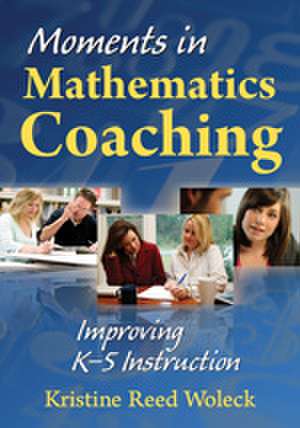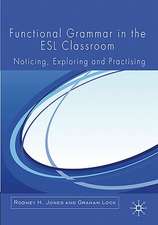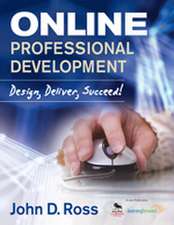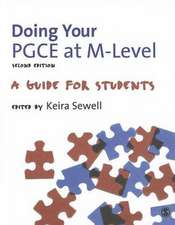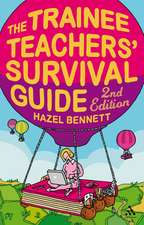Moments in Mathematics Coaching: Improving K–5 Instruction
Autor Kristine R. Wolecken Limba Engleză Paperback – 4 mai 2010
Preț: 281.67 lei
Nou
Puncte Express: 423
Preț estimativ în valută:
53.91€ • 56.13$ • 45.56£
53.91€ • 56.13$ • 45.56£
Carte tipărită la comandă
Livrare economică 10-24 martie
Preluare comenzi: 021 569.72.76
Specificații
ISBN-13: 9781412965842
ISBN-10: 1412965845
Pagini: 184
Dimensiuni: 178 x 254 x 15 mm
Greutate: 0.39 kg
Ediția:New.
Editura: SAGE Publications
Colecția Corwin
Locul publicării:Thousand Oaks, United States
ISBN-10: 1412965845
Pagini: 184
Dimensiuni: 178 x 254 x 15 mm
Greutate: 0.39 kg
Ediția:New.
Editura: SAGE Publications
Colecția Corwin
Locul publicării:Thousand Oaks, United States
Recenzii
"Woleck provides an instructive and insightful analysis of what makes coaching a powerful and capacity-building resource for schools dedicated to ensuring excellence in teaching and learning. This is a highly engaging and informative account of how effective coaching skills develop and become refined through research-based study, daily practice, and ongoing reflection. What makes this book stand out is that Woleck treats mind-set and principle-based understanding as core dimension that develop and promote expertise. The author's melding of research, practice, and reflection is done artfully, enhancing the appeal and usefulness of the book as both a personal resource for educators and a tool for ongoing, collaborative study in text-based professional development."
"A must-read for all mathematics teacher coaches. Woleck brings us into her coaching life by sharing these cases from her work. Through the engaging details of these personal stories, she skillfully leads us into considering various coaching models, essential coaching skills, and effective coaching practices. Focus questions at the end of each chapter add an incentive for readers to deepen their own practice and use this book as the basis for study groups."
"For the times when working as a math coach can make us feel unsure and shaky, Woleck’s book offers some steady, solid ground. The wisdom she has gained through years of coaching is evident. She has melded and adapted several models of coaching for her practice in ways that make good sense. In her telling of actual classroom cases, we can appreciate just how adaptable and flexible coaching requires us to be in taking a range of coaching stances and in filling a variety of roles. Woleck has not shied away from addressing the dilemmas coaches face in their practice nor simplified the complexity of the decisions coaches must regularly make. This book is replete with usable resources to help us develop and refine our coaching practices."
"This book stands out as one that gives a full picture of the role of the coach while being extremely specific. Beyond the obvious tasks of getting started and planning with teachers, the book discusses aspects of the job that are rarely covered in coaching books. Cases ground the reader in the important features of the job and are used to point out links to research. I recommend this as a handbook for all math coaches."
"A must-read for all mathematics teacher coaches. Woleck brings us into her coaching life by sharing these cases from her work. Through the engaging details of these personal stories, she skillfully leads us into considering various coaching models, essential coaching skills, and effective coaching practices. Focus questions at the end of each chapter add an incentive for readers to deepen their own practice and use this book as the basis for study groups."
"For the times when working as a math coach can make us feel unsure and shaky, Woleck’s book offers some steady, solid ground. The wisdom she has gained through years of coaching is evident. She has melded and adapted several models of coaching for her practice in ways that make good sense. In her telling of actual classroom cases, we can appreciate just how adaptable and flexible coaching requires us to be in taking a range of coaching stances and in filling a variety of roles. Woleck has not shied away from addressing the dilemmas coaches face in their practice nor simplified the complexity of the decisions coaches must regularly make. This book is replete with usable resources to help us develop and refine our coaching practices."
"This book stands out as one that gives a full picture of the role of the coach while being extremely specific. Beyond the obvious tasks of getting started and planning with teachers, the book discusses aspects of the job that are rarely covered in coaching books. Cases ground the reader in the important features of the job and are used to point out links to research. I recommend this as a handbook for all math coaches."
Cuprins
Preface
Acknowledgments
About the Author
Part I. The Coach's Work
1. What Is Coaching?
Case: Coaching in Action, Ann, Grade 5
Taking a Closer Look
Research-Based Models of Coaching
Keys to Developing a Coaching Model
Questions for Reflecting and Linking to Practice
2. Starting the School Year
Making Introductions
Establishing Trust
Deciding Who to Coach
Deciding Who Not to Coach . . . Then What?
Getting Organized
Communicating With Administrators
Keys to Getting Started
Questions for Reflecting and Linking to Practice
3. The Coaching Cycle
Case: Decision Making in the Coaching Cycle, Fiona, Kindergarten
Taking a Closer Look
Defining the Focus
Coach's Role, Teacher's Role
Fiona's Case, Continued
Taking a Closer Look
The Need for Variations in the Coaching Cycle
Keys to the Coaching Cycle
Questions for Reflecting and Linking to Practice
Part II. Tools for Coaching
4. Using Curriculum
Defining the Meaning of Curriculum
Case: Talking About Curriculum, Sue, Grade 2
Taking a Closer Look
Using the Curriculum as a Coaching Tool
Keys to Coaching With Curriculum
Questions for Reflecting and Linking to Practice
5. The Role of Questioning
Case: Different Questions for Different Purposes, Nancy, Grade 1
Taking a Closer Look
Case: Planning the Questions, Rick, Grade 4
Taking a Closer Look
Case: When Open-Ended Questions Aren't Enough, Carolyn, Grade 1
Taking a Closer Look
Keys to Questioning
Questions for Reflecting and Linking to Practice
6. Being Explicit
Case: Making Explicit Moves, Keith, Grade 4
Taking a Closer Look
Keys to Being Explicit
Questions for Reflecting and Linking to Practice
7. Using Data
Case: Creating Urgency Through Data, Peggy, Grade 5
Taking a Closer Look
Tools to Facilitate the Use of Data
Developing Student-Focused Action Plans
Keys to Using Data
Final Thoughts About Data
Questions for Reflecting and Linking to Practice
Part III. Coaching Dilemmas
8. Confronting Classroom Errors
Case: Keeping the Mathematics in Mind, Holly, Grade 3
Taking a Closer Look
Case: Deciding When to Address an Error, Maggie, Grade 5
Taking a Closer Look
Being Proactive: Discussing How to Address an Error
Being Proactive: Building Mathematical Knowledge to Avoid Errors
Keys to Confronting Errors
Questions for Reflecting and Linking to Practice
9. Transforming the Demonstration Lesson
Case: To Demo or Not to Demo? Janet, Kindergarten
Taking a Closer Look
Keys to Transforming the Demo Lesson
Questions for Reflecting and Linking to Practice
10. The Coach as a Learner
Case: Doing the Math, Lisa, Grade 5
Taking a Closer Look
Permission to Be a Learner
Keeping the Teacher in Mind
Keys to Being Coach AND Learner
Questions for Reflecting and Linking to Practice
Part IV. Growing the Coach
11. Professional Development for the Coach
Identifying What Coaches Need to Know
Moving From Research to Practice
Coaching Simulations
Journaling as a Tool for Learning
Belonging to a Coaching Community
Keys to Professional Development for the Coach
Questions for Reflecting and Linking to Practice
Conclusion
Resource A. Resources to Develop Mathematical and Pedagogical Content knowledge
Resource B. Sources of Math Coach Professional Development
References
Index
Acknowledgments
About the Author
Part I. The Coach's Work
1. What Is Coaching?
Case: Coaching in Action, Ann, Grade 5
Taking a Closer Look
Research-Based Models of Coaching
Keys to Developing a Coaching Model
Questions for Reflecting and Linking to Practice
2. Starting the School Year
Making Introductions
Establishing Trust
Deciding Who to Coach
Deciding Who Not to Coach . . . Then What?
Getting Organized
Communicating With Administrators
Keys to Getting Started
Questions for Reflecting and Linking to Practice
3. The Coaching Cycle
Case: Decision Making in the Coaching Cycle, Fiona, Kindergarten
Taking a Closer Look
Defining the Focus
Coach's Role, Teacher's Role
Fiona's Case, Continued
Taking a Closer Look
The Need for Variations in the Coaching Cycle
Keys to the Coaching Cycle
Questions for Reflecting and Linking to Practice
Part II. Tools for Coaching
4. Using Curriculum
Defining the Meaning of Curriculum
Case: Talking About Curriculum, Sue, Grade 2
Taking a Closer Look
Using the Curriculum as a Coaching Tool
Keys to Coaching With Curriculum
Questions for Reflecting and Linking to Practice
5. The Role of Questioning
Case: Different Questions for Different Purposes, Nancy, Grade 1
Taking a Closer Look
Case: Planning the Questions, Rick, Grade 4
Taking a Closer Look
Case: When Open-Ended Questions Aren't Enough, Carolyn, Grade 1
Taking a Closer Look
Keys to Questioning
Questions for Reflecting and Linking to Practice
6. Being Explicit
Case: Making Explicit Moves, Keith, Grade 4
Taking a Closer Look
Keys to Being Explicit
Questions for Reflecting and Linking to Practice
7. Using Data
Case: Creating Urgency Through Data, Peggy, Grade 5
Taking a Closer Look
Tools to Facilitate the Use of Data
Developing Student-Focused Action Plans
Keys to Using Data
Final Thoughts About Data
Questions for Reflecting and Linking to Practice
Part III. Coaching Dilemmas
8. Confronting Classroom Errors
Case: Keeping the Mathematics in Mind, Holly, Grade 3
Taking a Closer Look
Case: Deciding When to Address an Error, Maggie, Grade 5
Taking a Closer Look
Being Proactive: Discussing How to Address an Error
Being Proactive: Building Mathematical Knowledge to Avoid Errors
Keys to Confronting Errors
Questions for Reflecting and Linking to Practice
9. Transforming the Demonstration Lesson
Case: To Demo or Not to Demo? Janet, Kindergarten
Taking a Closer Look
Keys to Transforming the Demo Lesson
Questions for Reflecting and Linking to Practice
10. The Coach as a Learner
Case: Doing the Math, Lisa, Grade 5
Taking a Closer Look
Permission to Be a Learner
Keeping the Teacher in Mind
Keys to Being Coach AND Learner
Questions for Reflecting and Linking to Practice
Part IV. Growing the Coach
11. Professional Development for the Coach
Identifying What Coaches Need to Know
Moving From Research to Practice
Coaching Simulations
Journaling as a Tool for Learning
Belonging to a Coaching Community
Keys to Professional Development for the Coach
Questions for Reflecting and Linking to Practice
Conclusion
Resource A. Resources to Develop Mathematical and Pedagogical Content knowledge
Resource B. Sources of Math Coach Professional Development
References
Index
Notă biografică
Kristine Woleck is the K-5 mathematics coordinator for the New Canaan Public Schools in New Canaan, Connecticut. Prior to this position, she served as a K-8 staff developer, math coach/specialist, and mathematics consultant in both public and private schools in New York, Massachusetts, and Connecticut. She began her career as a first-grade teacher in Connecticut.
Kris¿ graduate studies in the Bank Street College of Education Mathematics Leadership Program sparked her interest in teacher leadership in mathematics and pushed her to pursue her study of staff development and ultimately coaching. With a sixth-year diploma in educational leadership and administration from the University of Connecticut, she is interested in examining how school administrators can most effectively bring principles of coaching into their supervision of teachers.
Kris has authored several articles in professional journals based on her classroom teaching experiences, coaching work, and her experience as a facilitator of online coaching seminars in conjunction with the Education Alliance at Brown University. Her work has been published in Teaching Children Mathematics, the 2001 Yearbook of the National Council of Teachers of Mathematics (NCTM), and the Journal of Staff Development. Most recently, she was selected as a 2009-2010 Classroom Teaching Fellow in the United States Department of Education Teaching Ambassador Fellowship program to include practitioner perspectives and voice in the development of educational policy.
Kris¿ graduate studies in the Bank Street College of Education Mathematics Leadership Program sparked her interest in teacher leadership in mathematics and pushed her to pursue her study of staff development and ultimately coaching. With a sixth-year diploma in educational leadership and administration from the University of Connecticut, she is interested in examining how school administrators can most effectively bring principles of coaching into their supervision of teachers.
Kris has authored several articles in professional journals based on her classroom teaching experiences, coaching work, and her experience as a facilitator of online coaching seminars in conjunction with the Education Alliance at Brown University. Her work has been published in Teaching Children Mathematics, the 2001 Yearbook of the National Council of Teachers of Mathematics (NCTM), and the Journal of Staff Development. Most recently, she was selected as a 2009-2010 Classroom Teaching Fellow in the United States Department of Education Teaching Ambassador Fellowship program to include practitioner perspectives and voice in the development of educational policy.
Descriere
The author unpacks specific cases or "moments" from her years as a mathematics coach, discussing what effective coaching looks like in practice, how to build relationships with teachers, and more.
